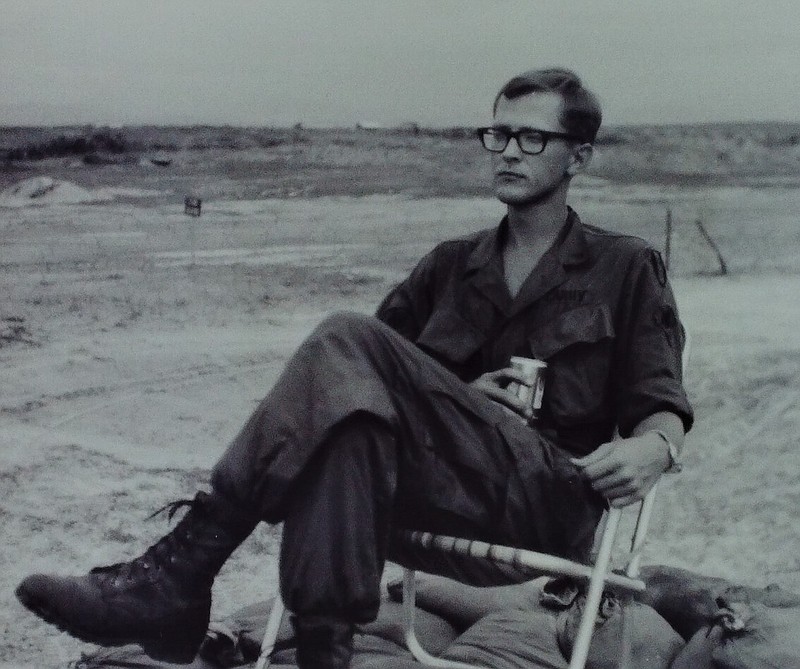The latter weeks of April 1968 brought a welcome lull in activity for the late Roger Buchta, of Lohman, who was serving as a medic with the 18th Surgical Hospital in Quang Tri near the demilitarized zone (DMZ) of South Vietnam. Three months earlier heralded the beginning of the Tet Offensive, resulting in many casualties to be treated. This was followed by Operation Pegasus, which became one of the largest offensive operations of the war by South Vietnamese and U.S. forces.
This period of calm for the medical personnel at Quang Tri soon came to an end, leaving Buchta with powerful memories that would be resurrected decades later when he unexpectedly met one of the family members of a casualty he placed in a body bag.
"My older brother, Charles Lee Frisby, was born in 1944 with most of his right ear missing," Russellville resident Dana Frisby said. "There was another infant in the East St. Louis area born with an identical issue, so a doctor removed part of my father's lower rib and used the bone and grafted skin to construct an ear for both my brother and the other child."
He added, "Years later, my brother was married and living in East St. Louis when he decided to join the U.S. Army in 1966. His ear never looked completely natural and we thought he might have hearing loss, which might prevent him from being eligible for the military, but he was able to enlist."
Deploying to Vietnam in early 1968 during the large-scale, coordinated attacks by North Vietnamese forces that became known as the Tet Offensive, Frisby was assigned to 3rd Squadron of the 5th U.S. Cavalry. Given little time to adjust to his new surroundings, he was quickly immersed in combat operations and leading troops in the vicinity of Quang Tri near the DMZ, which at the time was swarming with enemy activity.
While leading his platoon on patrol April 30, 1968, Frisby and his fellow soldiers were attacked by an overwhelming force of North Vietnamese troops. During the firefight that ensued, Frisby and every soldier in his platoon were killed. Their bodies were recovered and transported to the military base at Quang Tri.
Buchta was one of the medical personnel at the hospital responsible for processing the remains of the casualties, collecting their information and placing them in body bags. Frisby's body, disfigured from the battle, left imprinted memories with Buchta that would be awakened decades later.
"My brother's body was eventually brought home and he was buried in Jefferson Barracks National Cemetery in St. Louis," Dana said. "My mother was quite distraught over losing her son and I don't believe that she ever fully recovered from it."
He continued, "At the time of his death, I was 15 years old and my brother's wife was still living in East St. Louis. One of the saddest parts of it all was that when he was killed, he had two daughters both under 3 years old."
The pain of loss has not diminished by the passage of years, demonstrated by Dana's mournful explanation that when his brother's remains were returned home, the only recognizable part of his upper body was his right ear.
In later years, Dana moved to the community of Russellville and became the co-owner of Vault Pizza & Sandwiches. One day in 2014, while working at the restaurant, he and a regular customer of the establishment, Don Buchta, discussed the service of their brothers in the Vietnam War.
"Don said that his brother, Roger Buchta, was in Vietnam the same time that my brother was killed," Dana said. "He said that he should bring his brother up to visit with me about it and I told him that would be fine, but I didn't think much more about it."
Several days later, Don brought Roger into the restaurant to speak with Dana, and the three engaged in what became a very lengthy, emotional conversation.
"When I described to Roger what happened to my brother's platoon, he said that he was at Quang Tri at that time and helped put the bodies of my brother's platoon in body bags while processing their remains," Dana said. Following an emotional pause, he added, "He remembered my brothers disfigured right ear and his unique last name."
The younger Frisby admits he was at first skeptical, but the detail of Buchta's reflections regarding specific circumstances of that fateful day convinced him of the validity of the correlation. Additionally, Buchta's military records reveal that he was in fact working at the hospital at Quang Tri during this timeframe.
For years, Buchta quietly carried the weight of his time in the Vietnam War, seldom sharing with anyone other than his brother and close friends the experiences of witnessing egregious wounds of men his own age. Connecting with a family member, decades after processing the remains of their loved one, became yet another story he did not freely discuss.
Sadly, Buchta passed away in February 2019, joining in eternal rest the scores of young soldiers he witnessed perish during the tense days of the Vietnam War.
"East St. Louis and Russellville may only be a couple hours or so apart, but what are the chances of meeting the guy who put your brother in a body bag in a war thousands of miles from home and several decades earlier," Dana remarked.
"Both Roger and my brother are no longer here, but that conversation did provide our family with some closure," he continued. "I appreciate what Roger did and I know it wasn't easy for him to share that information, but I find solace knowing that he was professional in his duties and my brother's remains were treated in a respectable manner."
Jeremy P. Amick writes on behalf of the Silver Star Families of America.

